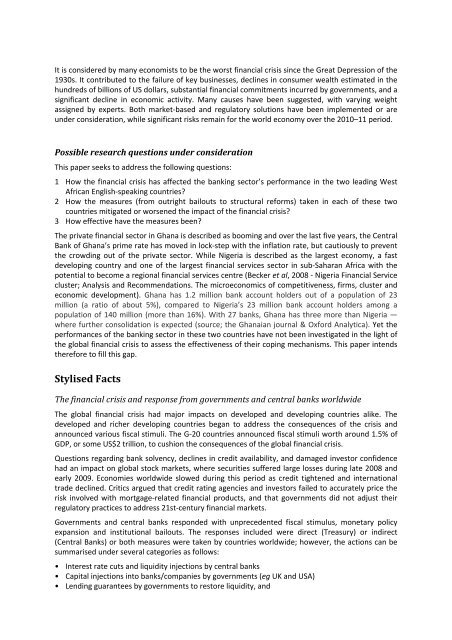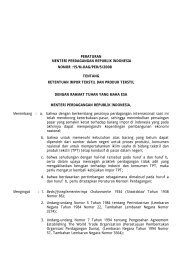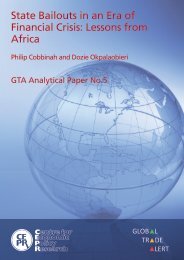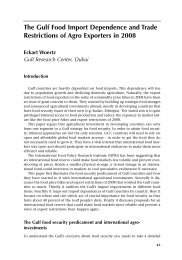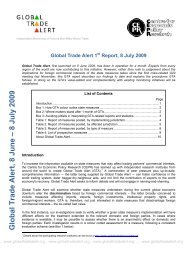It is considered by many economists to be the worst financial crisis since the Great Depression of the1930s. It contributed to the failure of key businesses, declines in consumer wealth estimated in thehundreds of billions of US dollars, substantial financial commitments incurred by governments, and asignificant decline in economic activity. Many causes have been suggested, with varying weightassigned by experts. Both market‐based and regulatory solutions have been implemented or areunder consideration, while significant risks remain for the world economy over the 2010–11 period.Possible research questions under considerationThis paper seeks to address the following questions:1 How the financial crisis has affected the banking sector’s performance in the two leading WestAfrican English‐speaking countries?2 How the measures (from outright bailouts to structural reforms) taken in each of these twocountries mitigated or worsened the impact of the financial crisis?3 How effective have the measures been?The private financial sector in Ghana is described as booming and over the last five years, the CentralBank of Ghana’s prime rate has moved in lock‐step with the inflation rate, but cautiously to preventthe crowding out of the private sector. While Nigeria is described as the largest economy, a fastdeveloping country and one of the largest financial services sector in sub‐Saharan Africa with thepotential to become a regional financial services centre (Becker et al, 2008 ‐ Nigeria Financial Servicecluster; Analysis and Recommendations. The microeconomics of competitiveness, firms, cluster andeconomic development). Ghana has 1.2 million bank account holders out of a population of 23million (a ratio of about 5%), compared to Nigeria’s 23 million bank account holders among apopulation of 140 million (more than 16%). With 27 banks, Ghana has three more than Nigeria —where further consolidation is expected (source; the Ghanaian journal & Oxford Analytica). Yet theperformances of the banking sector in these two countries have not been investigated in the light ofthe global financial crisis to assess the effectiveness of their coping mechanisms. This paper intendstherefore to fill this gap.Stylised FactsThe financial crisis and response from governments and central banks worldwideThe global financial crisis had major impacts on developed and developing countries alike. Thedeveloped and richer developing countries began to address the consequences of the crisis andannounced various fiscal stimuli. The G‐20 countries announced fiscal stimuli worth around 1.5% ofGDP, or some US$2 trillion, to cushion the consequences of the global financial crisis.Questions regarding bank solvency, declines in credit availability, and damaged investor confidencehad an impact on global stock markets, where securities suffered large losses during late 2008 andearly 2009. Economies worldwide slowed during this period as credit tightened and internationaltrade declined. Critics argued that credit rating agencies and investors failed to accurately price therisk involved with mortgage‐related financial products, and that governments did not adjust theirregulatory practices to address 21st‐century financial markets.Governments and central banks responded with unprecedented fiscal stimulus, monetary policyexpansion and institutional bailouts. The responses included were direct (Treasury) or indirect(Central Banks) or both measures were taken by countries worldwide; however, the actions can besummarised under several categories as follows:• Interest rate cuts and liquidity injections by central banks• Capital injections into banks/companies by governments (eg UK and USA)• Lending guarantees by governments to restore liquidity, and
• Reviving the ailing banking system through recapitalisation and strengthening of supervision• Bank deposit guarantees• Minimising market disruptions – crackdown on short selling• Fiscal stimulus packages to shore the economy out of recession – stimulating aggregate demand• Subsidies to ailing sectors.Outcomes of measures (from outright bailouts to structural reforms) taken on the bankingsector around the world (selected countries only)The financial sector crisis that broke out in the summer of 2007 disrupted the structure andfunctioning of the industry around the world. In order to preserve investors’ confidence and restoreviability, public policy responded to the crisis with liquidity and capital injections, implicit and explicitguarantee schemes as well as direct rescues and asset purchases. Public support backed majormergers aimed at rescuing distressed institutions. While many small banks, especially in the UnitedStates, went into liquidation, some medium and large‐sized financial institutions have not beenallowed to fail. The scope and cost of these crisis management measures are unprecedented.The numerous mergers occurred during the crisis have led to a significant increase of theconcentration levels of the banking industry in several countries. Between 2005, before the crisisbroke out, and 2009, the market share in deposits of the top five domestic institutions has increasedfrom 29.3% to 37.3% in the United States and from 58.3% to 61.3% in France. Similar patterns can beseen in the loan markets.In Europe, for example, several of the banks that have been bailed out or have been involved inorchestrated mergers have been subject to severe measures in terms of size reduction and limits onactivities. For example, Commerzbank, Hypo Real Estate, Landesbank Baden Württemberg andNorthern Rock have been required by the European Commission, among others, to cut their balancesheet by half. Similarly, ING, RBS and Lloyds have had measures imposed, ranging from theseparation of the insurance and banking businesses to restrictions on aggressive behaviours and onpotential acquisition activities or branches to be dismissed.In Australia, two significant banking mergers took place during the crisis, each involving a major bankand a significant mid‐tier institution – Westpac’s acquisition of St George in 2008 andCommonwealth Bank of Australia’s acquisition of BankWest in 2008. In addition, there wassignificant merger activity among smaller institutions and the number of credit unions declined from213 in 2001 to 143 in 2008. The Australian government provided timely fiscal stimulus measures,including the $42 billion Nation Building and Jobs Plan. Treasury estimates that, in the absence offiscal stimulus, growth would have contracted approximately 2.0% until September 2009. In October2008, the government announced a commitment to guarantee all retail deposits up to $1 millionunder the newly created Financial Claims Scheme. The guarantees supported confidence in thedeposit system, and also allowed ADIs to continue to raise funds in wholesale markets, both onshoreand offshore and despite the financial market turmoil, Australian banking customers continued tohave access to a significant number of providers evidenced by competitive pressures on interestrates, especially for mortgages. For example, a significant number of smaller lenders are offeringmortgages at rates of up to 1% lower than the four major banks.In Chili, the recent systemic crisis of 2008 brought about no significant consequences on the Chileanbanking industry. Indeed, the crisis came to be quite surmountable on the economy as a whole,cushioned as it was by a fiscal structural rule, a sound monetary policy and a favourable andsustained international price of copper – the country’s chief tradable good. The Chilean bankingsector is, and has been for a while, a quite concentrated one, where two large banks of all 25incumbent ones hold an indisputable dominant position, encompassing nearly 45% of the system’sloans. There have been a number of M&A in the Chilean banking system both before and throughoutthe 2008 systemic crisis. Neither of the two latest M&A is to be, nevertheless, mainly linked orascribed to it. It is frequently said that consolidation in the Chilean banking sector has taken placeroughly for the same reasons M&A happen.


